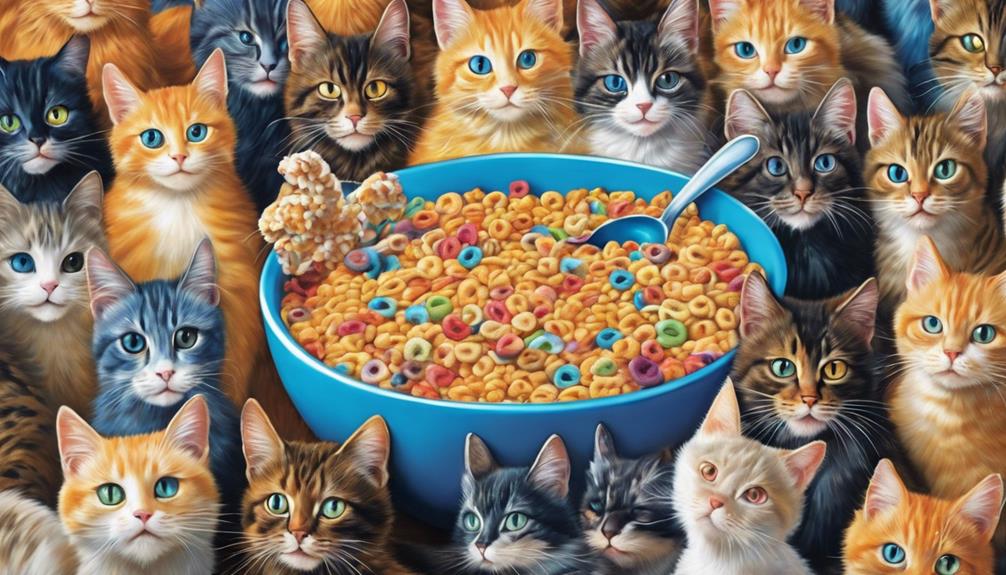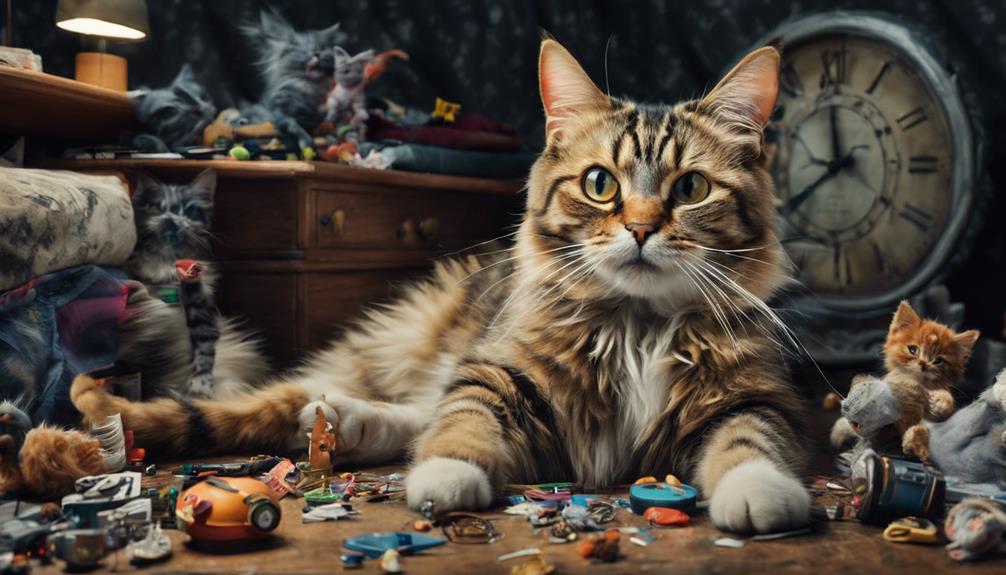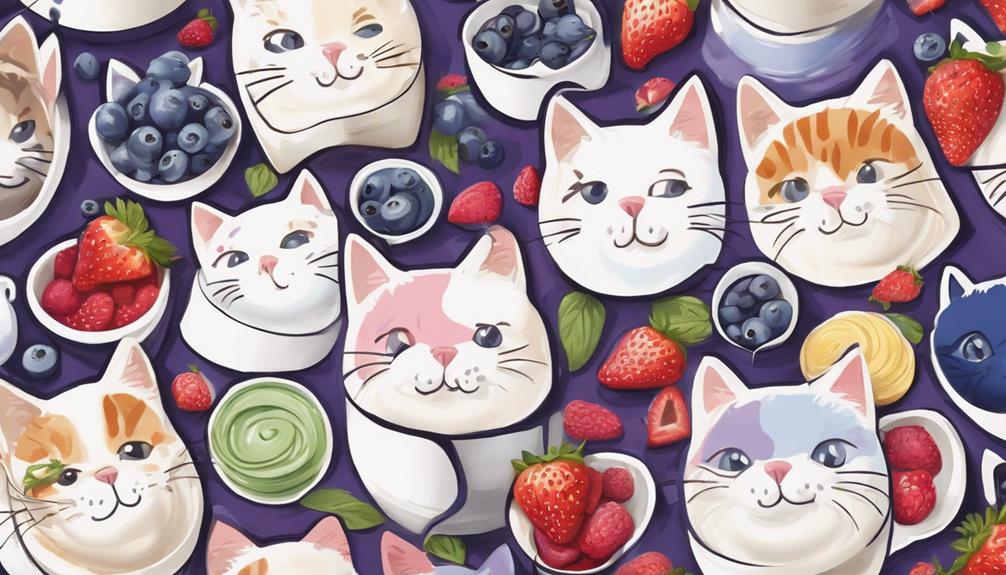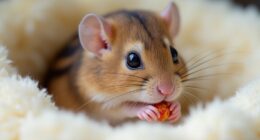Cats should avoid eating cereal as they need a meat-based diet. Their bodies struggle to digest grains, which can lead to issues. If curious, consult a vet before sharing cereal. There are safer snack options for cats. Cereal may cause digestive discomfort or weight gain. Monitor for changes after offering cereal and opt for low-sugar varieties. Balanced nutrition is key. Some cereals, like shredded wheat or plain Cheerios, pose fewer risks. Evaluating cereal impact on your cat's health is vital. High-quality info awaits beyond this snippet.
Key Takeaways
- Cats can eat cereal in moderation.
- Cereal should not replace a meat-based diet.
- Consult a vet before introducing cereal.
- Watch for digestive issues or allergic reactions.
- Choose plain cereals with minimal sugar.
Cereal and Feline Diet
Cats thrive on a meat-based diet and don't require grains like those found in cereal. Our feline friends are obligate carnivores, meaning their bodies are designed to get essential nutrients from animal proteins, not grains.
When it comes to choosing cat food, opt for options that are rich in high-quality animal proteins to support their overall health and well-being. Grains in cereal can actually lead to digestive issues in cats and may even cause sensitivities. It's important to prioritize feeding your furry companion a diet that aligns with their natural dietary requirements.
Consult a veterinarian before introducing any new food, including cereal, to your cat to make sure it's safe for them. Remember, a balanced and meat-based diet is the key to keeping your cat healthy and happy.
Nutritional Value of Cereal for Cats
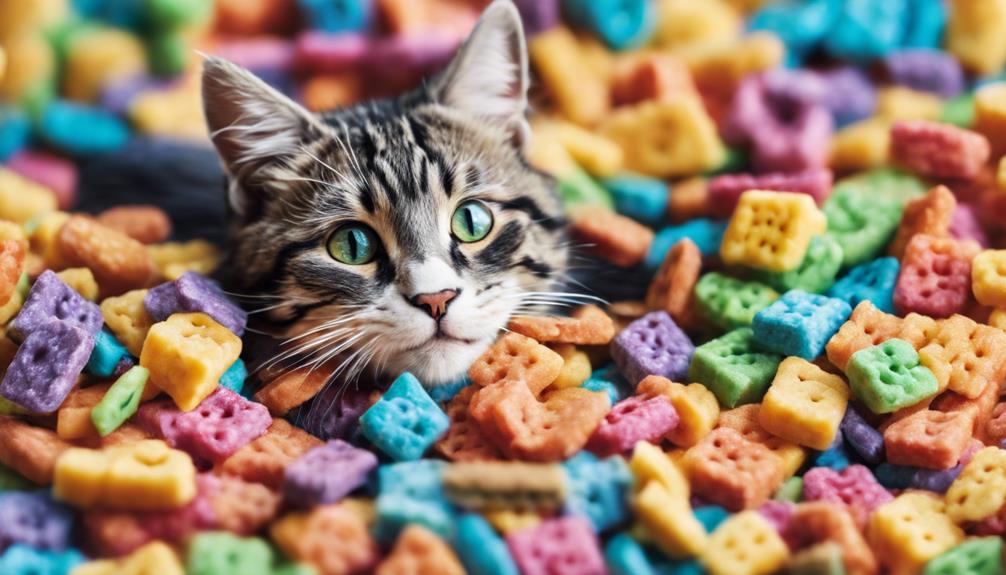
When considering the nutritional value of cereal for feline companions, it's important to recognize that grains, fiber, and synthetic vitamins and minerals make up its composition. While fiber in cereals can aid in proper digestion for cats, many cat foods contain more sugar than fiber, which may not be ideal for our furry friends.
Cats are obligate carnivores, meaning they primarily require meat in their diet, and they don't gain additional benefits from the grains found in cereal. Some cats may even have sensitivities to grains, leading to digestive issues when consuming cat foods with cereal ingredients.
It's vital to consult a veterinarian before introducing cereal to your cat, as it shouldn't replace a meat-based diet. Over time, feeding your cat cereal can potentially lead to weight gain and nutritional imbalances. Remember, when it comes to cat foods, prioritizing their specific dietary needs is key for their overall health and well-being.
Cereal Ingredients to Avoid for Cats
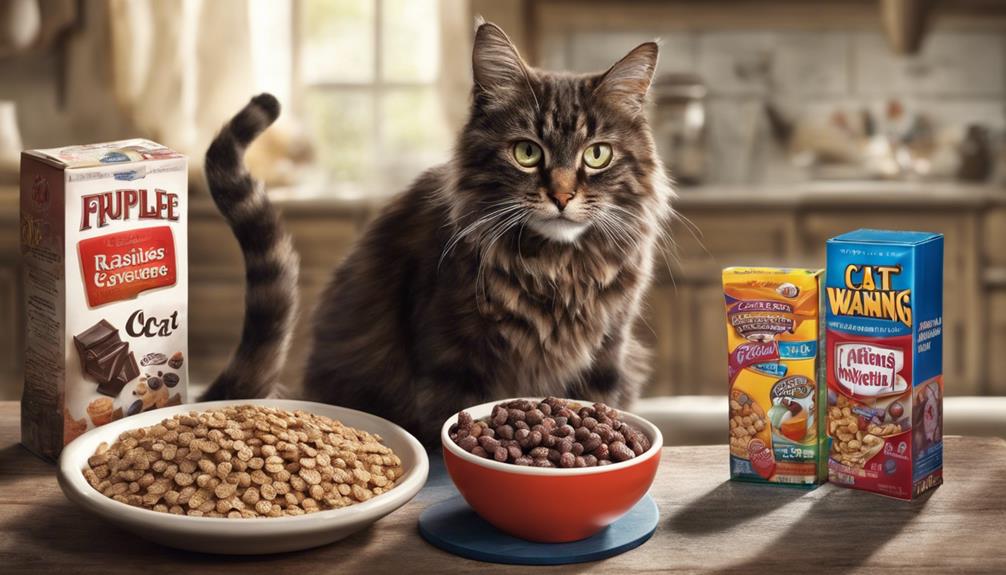
Considering the potential harm certain ingredients in cereals can pose to our feline companions, being mindful of what to avoid when selecting cereal for cats is vital. Some ingredients commonly found in cereals are bad for cats and should be avoided at all costs.
For instance, substances like chocolate, raisins, xylitol, macadamia nuts, and excessive sugar can have severe consequences if ingested by your furry friend. Chocolate and xylitol are especially toxic to cats and can lead to serious health issues. Raisins and macadamia nuts, if present in cereals, can also be harmful and cause adverse effects.
Additionally, excessive sugar in cereals can contribute to obesity and dental problems in cats. To safeguard your cat's well-being, carefully checking the ingredients of any cereal before sharing it with them is crucial. By being vigilant and avoiding these harmful substances, you can help keep your beloved feline friend safe and healthy.
Introducing Cereal to Your Cat

As pet owners, we may wonder about the suitability of introducing cereal to our cats. When pondering whether to feed your cat cereal, bear in mind that cats don't need cereal in their diet as they're obligate carnivores.
Here are some key points to ponder before incorporating cereal into your cat's diet:
- Cats shouldn't depend on cereal as a substitute for their regular, meat-based food for best nutrition.
- It's crucial to consult a veterinarian before introducing cereal to your cat to make sure it's safe for them.
- Excessive sugar in cereals can lead to health issues and weight gain in cats.
Monitoring Cats Response to Cereal

To assess how cats react to cereal, observe any physical or behavioral changes post-consumption. Keep a close eye on your feline friend for any signs of digestive issues, such as vomiting or diarrhea. Changes in behavior like lethargy or loss of appetite could also indicate a critical response to cereal.
Monitoring your cat's litter box habits is vital to guarantee there are no alterations in urine or stool consistency after consuming cereal. Additionally, watch out for allergic reactions like itching, redness, or swelling in your cat's skin or ears following cereal intake.
If you notice any concerning symptoms or changes in your cat's health related to eating cereal, it's important to consult with your veterinarian promptly. Your cat's digestive system is delicate, and any adverse reactions should be taken seriously to safeguard your furry companion's well-being.
Cereal as Occasional Treat for Cats
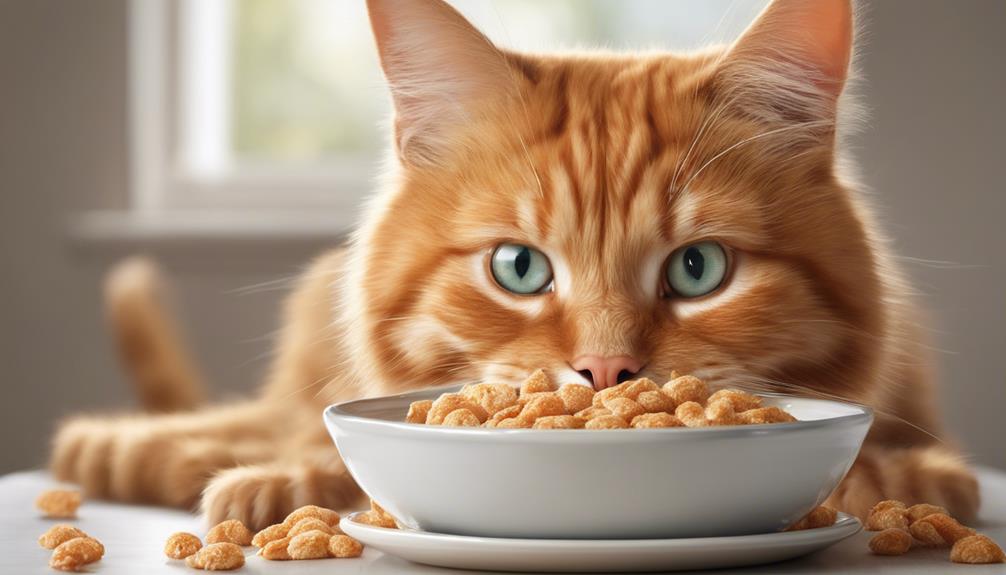
Cats can enjoy cereal as an occasional treat. However, it's important to remember that it shouldn't replace their main meat-based diet. While cats might find cereal novel and exciting, it doesn't provide significant nutritional value for them.
When offering cereal as a treat, keep portions in check to prevent digestive issues or unwanted weight gain.
Cats Digestive System
With their short digestive tract specialized for processing meat efficiently, cats may experience digestive issues if fed cereal regularly. Cats are obligate carnivores, meaning their bodies are designed to primarily digest animal proteins. When introducing cereal as an occasional treat for cats, it's important to take into account the impact on their digestive system.
- Cereal lacks essential nutrients for cats, potentially leading to deficiencies.
- Cats may struggle to fully digest the carbohydrates in cereal, causing gastrointestinal problems.
- Monitoring how cats respond to cereal treats is essential to guarantee their digestive health remains at its best.
Nutritional Value Consideration
When considering offering cereal as an occasional treat for cats, it's important to acknowledge its minimal nutritional value compared to their meat-based diet. Cats thrive on a diet rich in protein and specific nutrients essential for their well-being, which are primarily found in meat. While cereal may seem like a harmless snack, it lacks the necessary components that contribute to a cat's overall health.
Feeding cats cereal regularly can lead to weight gain due to its high carbohydrate content, which may not align with their dietary requirements. Hence, prioritizing a meat-based diet tailored to meet a cat's specific nutritional needs is vital.
Consult with a veterinarian before introducing any new foods, including cereal, to your cat's diet to make sure they remain healthy and happy.
Portion Control Tips
Limiting the amount of cereal given to feline companions is essential in maintaining their overall health and preventing potential issues such as weight gain and digestive disturbances. When offering cereal to cats, remember these tips:
- Small Portions: Opt for tiny amounts to prevent overconsumption.
- Rare Occasions: Save cereal treats for special moments to maintain their novelty.
- Watch for Reactions: Keep an eye on your cat's response and seek veterinary advice if any concerns arise.
Allergic Reactions to Cereal in Cats
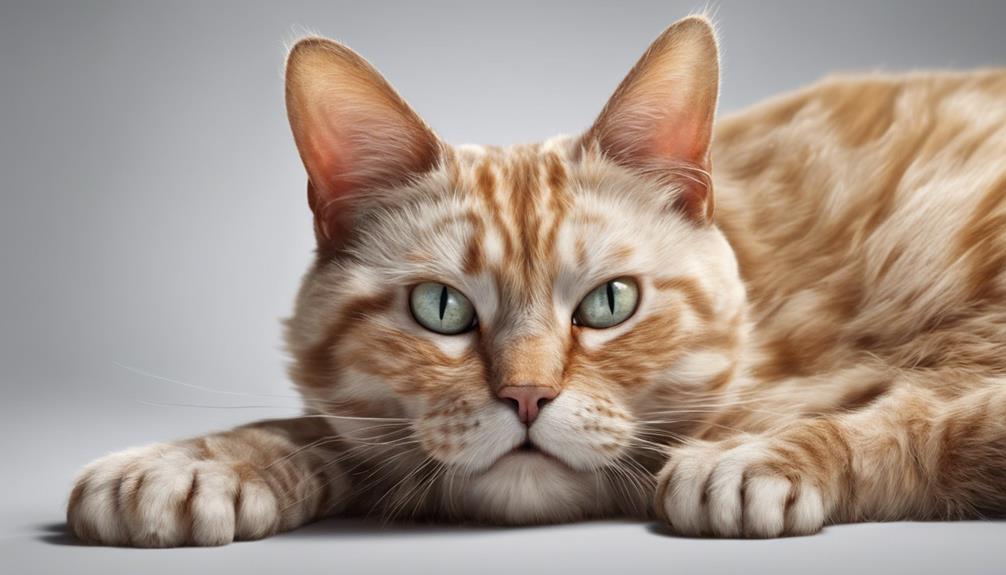
Experiencing allergic reactions to cereal can be concerning for cats, as it may result in various uncomfortable symptoms. Cats can eat a variety of foods, but some may have sensitivities to certain ingredients like cereal.
Allergic reactions in cats can manifest in different ways, such as skin rashes, itching, gastrointestinal upset, vomiting, diarrhea, excessive scratching, sneezing, coughing, or runny eyes. These symptoms can lead to inflammation, discomfort, and potentially even nutrient deficiencies if not addressed.
If you notice any of these signs in your furry friend after consuming cereal, it's crucial to consult a veterinarian promptly. They can help determine if the symptoms are indeed due to a cereal allergy and provide guidance on managing your cat's diet to prevent future reactions.
Cat-Friendly Cereal Options

Cat owners can provide their feline companions with suitable cereal options, such as plain, unsweetened varieties like shredded wheat or plain Cheerios. When selecting a cereal for your cat, it's important to take into account their dietary needs and potential sensitivities. Here are some cat-friendly cereal options to contemplate:
- Shredded Wheat: This simple and unsweetened cereal is a good choice for cats as it contains no added sugars or artificial flavors.
- Plain Cheerios: Cats may enjoy the simple taste of Cheerios without any harmful additives that could upset their stomach.
- Rice Krispies: Another option for cat-friendly cereal is plain Rice Krispies, as they're typically low in sugar and additives.
Risks of Cereal Overconsumption in Cats

Discussing the risks of overconsumption of cereal in cats, it's important to recognize the potential implications on their health and well-being. Cats eat, and when they indulge in too much cereal, it can lead to weight gain due to the high carbohydrate content present. This excess weight can put a strain on their joints and overall mobility.
Additionally, cats may struggle to digest large amounts of cereal, potentially resulting in digestive issues like vomiting or diarrhea. Excessive consumption of cereal can also lead to the storage of excess carbs as fat reserves in a cat's body, increasing the risk of obesity and related health issues.
Since cereals don't provide long-lasting satiety for cats compared to a meat-based diet, overeating cereal can leave them feeling hungry shortly after their meal. To make sure our feline companions stay healthy and happy, it's vital to be mindful of their diet and limit their intake of cereals to prevent these risks from impacting their well-being.
Balancing Cereal With Cats Regular Diet
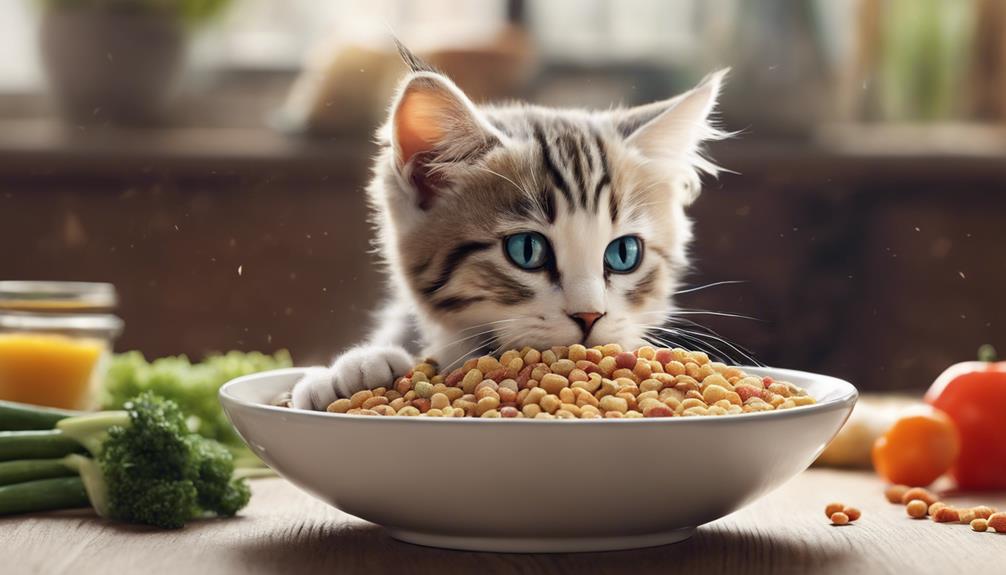
How can we guarantee that cereal is balanced with a cat's regular diet to sustain their health and well-being?
When it comes to making sure our feline friends get the best nutrition possible, it's important to think about how cereal fits into their diet. Here are some tips to help us strike the right balance:
- Consult a Vet: Before adding cereal to our cats' meals, consulting a veterinarian is important. They can provide guidance on how to incorporate it safely without compromising our cats' overall health.
- Keep it Occasional: While cats can eat cereal, it should be treated as an occasional treat rather than a staple in their diet. This helps prevent nutritional imbalances and keeps their carnivorous needs in check.
- Balance is Key: To maintain our cats' well-being, it's crucial to ensure that their main diet consists of high-quality meat-based foods. Cereal can complement this diet, but it shouldn't replace essential nutrients they get from their regular meals.
Cereal and Cat Digestive Health
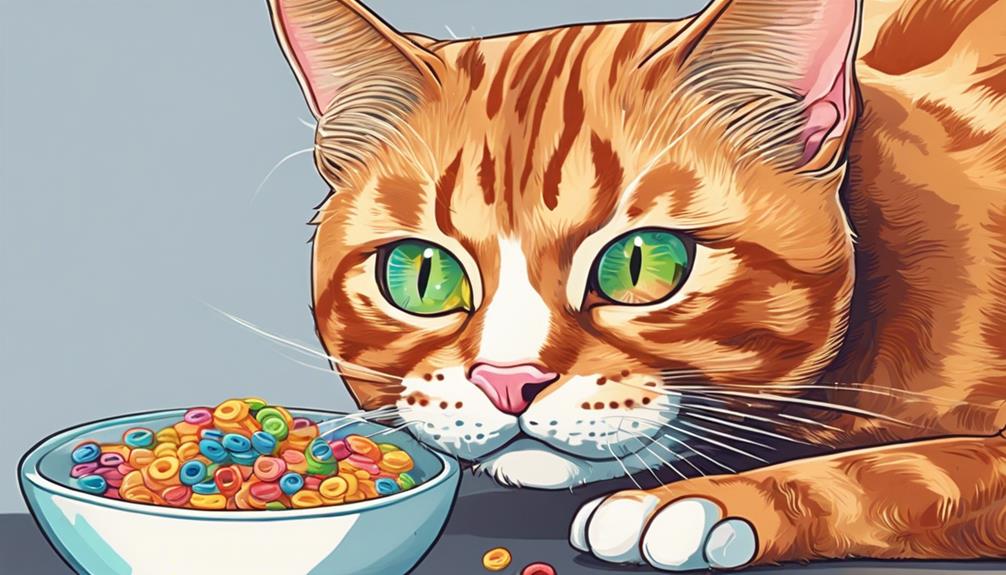
When considering the impact of cereal on feline digestive health, it is important to recognize that cereals can provide beneficial fiber content for cats. Fiber plays a crucial role in assisting digestion, encouraging regular bowel movements, and supporting overall digestive health in our feline companions. However, it is vital to make sure that the fiber content in their diet is balanced and appropriate, as excessive consumption of cereal can lead to digestive issues in cats. Some cats may also have sensitivities to grains commonly found in cereals, which can impact their digestive system negatively. Hence, maintaining a well-rounded diet that includes suitable sources of fiber is key to ensuring top-notch digestive health for our beloved pets.
| Benefits of Fiber in Cat's Diet | Effects of Excessive Cereal Consumption |
|---|---|
| Supports Digestion | Digestive Issues |
| Promotes Bowel Regularity | Sensitivities to Grains |
Cat Behavior Changes With Cereal Intake

With cereal intake, cats may exhibit changes in behavior that reflect their individual preferences and tolerances. It's intriguing to observe how our feline friends react to new experiences, such as trying out a bit of cereal. Here are a few common behavior changes you might notice when cats eat cereal:
- Increased Curiosity: Cats may show heightened curiosity or interest in cereal due to its unique texture or smell. You might catch your cat sniffing around the cereal box or attempting to paw at the crunchy pieces.
- Restlessness or Excitement: Some cats may become more active or restless after consuming cereal. They might engage in playful behavior or exhibit increased energy levels, possibly due to the novelty of the food.
- Varied Reactions: Behavioral changes in cats with cereal intake can vary widely based on their individual preferences and tolerances. While some cats may show enthusiasm for cereal, others mightn't show much interest at all.
It's vital to monitor your cat's behavior closely after they eat cereal to make certain they're comfortable and not experiencing any negative reactions.
Offering Cereal Responsibly to Cats

When providing cereal to cats, it's vital to take into account their digestive system, possible allergies, and proper portion control.
Before sharing any cereal with your feline friend, be mindful of their unique dietary needs and limitations.
Ensuring safe and responsible choices can result in a positive treat experience for both you and your cat.
Cats Digestive System
Indulging cats with cereal should be approached cautiously due to their delicate digestive systems. Cats have a sensitive digestive system that may not tolerate cereals well due to their high carbohydrate content.
Here are some important points to keep in mind:
- High Carbohydrate Content: Cereals contain high levels of carbohydrates, which can be challenging for cats to digest properly.
- Digestive Issues: Cats may struggle to digest the grains in cereals, leading to potential problems like diarrhea or upset stomach.
- Weight Management: The high-carb content in cereals can contribute to weight gain in cats, impacting their overall health.
Considering these factors, opting for alternative sources of fiber and nutrients more suited to a cat's carnivorous diet is a wiser choice than offering cereal.
Safe Cereal Options
Selecting suitable types of cereal is vital when contemplating offering it to cats, ensuring their safety and well-being. Some safe options for cats include plain, unsweetened cereals with minimal sugar content and no harmful additives. Whole grain cereals can be a better choice if given in moderation.
Remember, cats can enjoy small amounts of cereal as an occasional treat, but it should never replace their regular diet. When choosing a cereal for cats to eat, steer clear of those with artificial colors, flavors, or high sugar levels. It's essential to keep a close eye on your feline friends for any signs of digestive issues or allergies when introducing cereal to their diet.
Always prioritize their health and happiness when offering them new foods.
Portion Control
Transitioning from secure cereal options for cats, it's crucial to consider portion control when providing cereal to our feline companions. When determining how much cereal to feed your cat, keep these points in mind:
- Occasional Treat: Offer cereal to your cat as a rare indulgence rather than a regular meal.
- Limit Amount: Manage the portion size to avoid potential digestive upset in your cat.
- Moderation is Key: Guarantee that cereal isn't a substantial part of your cat's diet to prevent weight gain.
Cereal Alternatives for Feline Snacking

When considering alternatives to cereal for feline snacking, it's important to focus on options that cater to a cat's carnivorous nature and nutritional needs.
While cats eat meat primarily, they can enjoy small amounts of cooked vegetables like pumpkin or sweet potato for added fiber.
Catnip, a safe herb that many cats love, can be sprinkled on their food as a tasty snack alternative.
Freeze-dried meat treats are another excellent choice, offering high protein content and low carbs.
Although cats are obligate carnivores, some may appreciate occasional treats like watermelon or cantaloupe in small amounts.
Homemade cat treats using cooked chicken or fish can also be a healthy and satisfying substitute for cereal snacks.
Consulting Vet About Cats Cereal Consumption
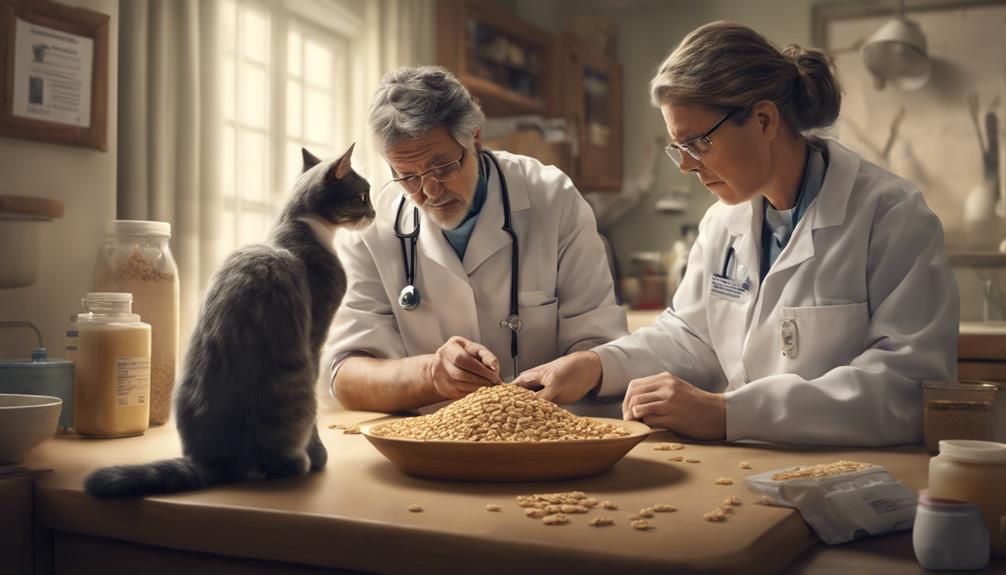
Considering your cat's health and well-being, consulting a veterinarian before introducing cereal into their diet is essential. When you consult a vet about your cat's cereal consumption, you can expect the following benefits:
- Assess potential risks and benefits: Vets can provide insights into how cereal may impact your cat's digestive system and overall health.
- Tailored advice: Your vet can offer personalized recommendations based on your cat's unique health needs and dietary requirements.
- Allergy assessment: Vets can determine if your cat has any allergies or sensitivities to grains or gluten commonly found in cereal.
Frequently Asked Questions
Can a Cat Eat Dry Cereal?
We enjoy dry cereal occasionally. It can be safe for cats, providing a crunchy treat. Some cats prefer softened cereal. Remember, moderation is key, and cereal isn't necessary for a cat's diet, but it can be a fun snack.
Can Cat Eat Cheerios?
We love indulging in Cheerios occasionally. They can be a safe and crunchy treat for cats when given in moderation. Remember to skip the milk, monitor reactions, and consult a vet if any issues arise.
Can Cats Drink the Milk From My Cereal?
We advise against giving cats the milk from cereal. It can lead to digestive issues due to lactose intolerance. Cats don't benefit nutritionally from cereal and milk. It's best to stick to cat-appropriate foods.
Can Cats Have Rice Krispies Cereal?
We should avoid feeding cats Rice Krispies cereal due to its high sugar content and lack of nutritional benefits for them. This cereal can lead to health issues like obesity and diabetes, so it's best to stick to species-appropriate cat food.
Is It Safe for Cats to Eat Cereal If They Can Eat Rice Pudding?
Cats can eat rice pudding, but feeding them cereal may not be safe. Most cereals contain sugar and other ingredients that can be harmful to cats. It’s best to stick to their regular diet and avoid giving them any type of cereal, including rice pudding.
Conclusion
To sum up, while cats can technically eat cereal, it shouldn't be a regular part of their diet. Cereal lacks the essential nutrients cats need and can potentially cause digestive issues.
It's best to stick to cat-specific foods to guarantee your feline friend stays healthy and happy.
So, next time you're tempted to share your breakfast with your kitty, remember that moderation is key when it comes to offering cereal as a treat.
